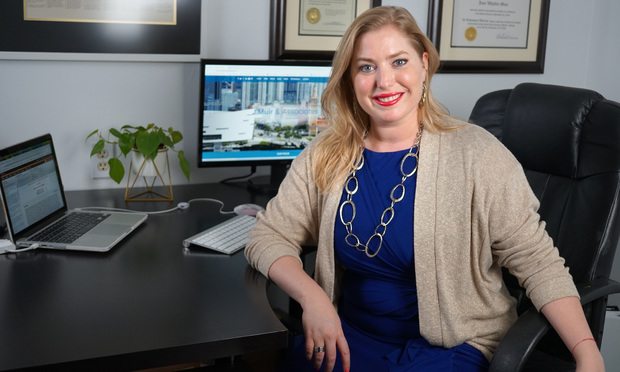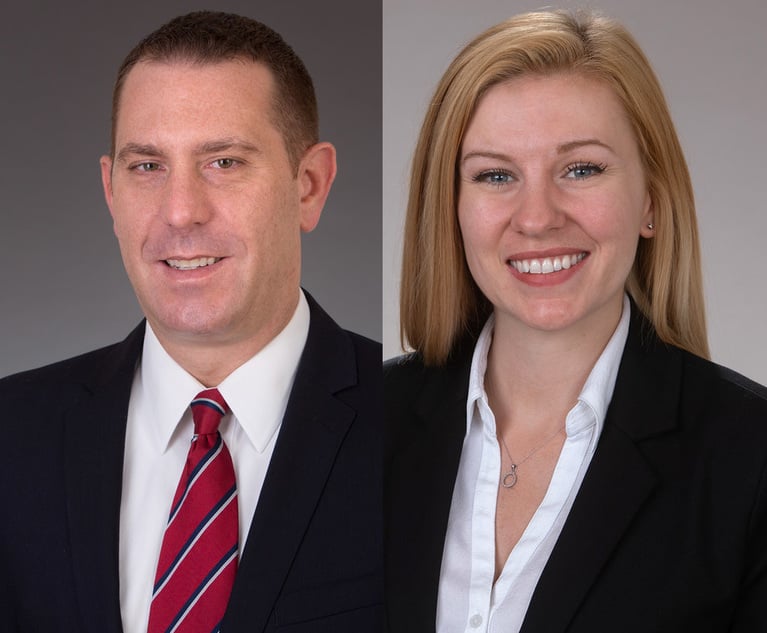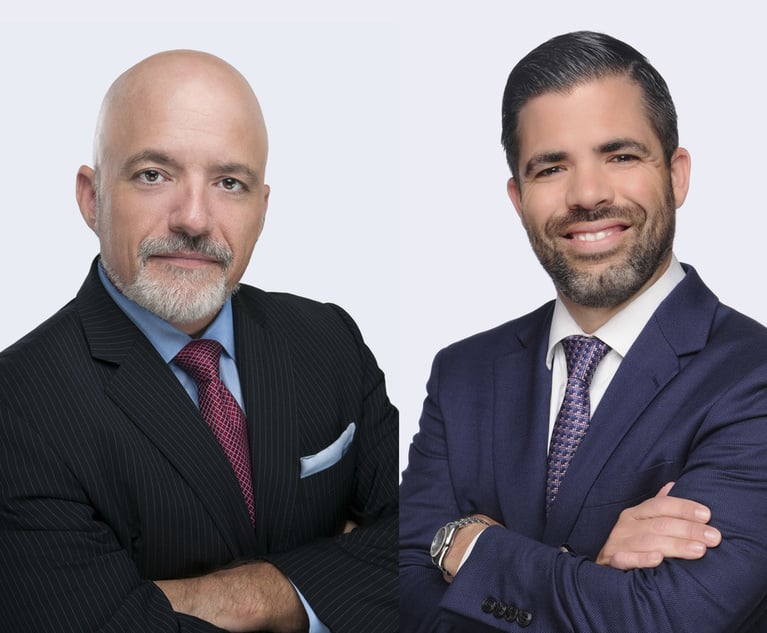Small Business Options to Help S. Florida Businesses Survive Coronavirus
Assuming consistent costs, we may be quickly approaching the end of many companies' cash reserve. Luckily, there are some resources to help South Florida businesses survive coronavirus.
April 27, 2020 at 12:48 PM
5 minute read
 Jane Muir Shareholde J. Muir & Associates P.A. Miami
Jane Muir Shareholde J. Muir & Associates P.A. MiamiSince Miami-Dade Mayor Carlos Gimenez ordered "nonessential retail and commercial establishments" to be closed on March 19 to prevent the spread of the coronavirus, many predicted an economic impact.
South Florida small businesses are already experiencing the effects. Some, like groceries, wine and spirits, and IT companies, are booming, but many of our thriving local businesses, like hospitality, entertainment, beauty and fitness, cannot operate.
Even though best practice is to reserve three months of operating expenses, the average small business holds only 27 days cash reserve, and half of all small businesses hold a cash buffer of less than one month. Assuming consistent costs, we may be quickly approaching the end of many companies' cash reserve. Luckily, there are some resources to help South Florida businesses survive coronavirus.
At the state level, Gov. Ron DeSantis activated the Florida Small Business Emergency Bridge Loan Program, which can assist small businesses impacted by the coronavirus. Managed by the Florida Department of Economic Opportunity, the program will provide short-term, interest-free loans to small businesses experiencing economic injury.
All business owners with two to 100 employees located in Florida affected by the coronavirus may apply for short-term loans up to $50,000, interest-free for up to one year. These loans are designed to bridge the gap to either federal SBA loans or commercially available loans.
DEO will work with every borrower to ensure that repayment of the loan isn't an overwhelming burden. To be eligible, a business must have been established prior to March 9, and demonstrate economic impacts as a result of the coronavirus.
Another Florida program to help small business is the "Short Time Compensation Program," a voluntary employer program designed to help employers maintain their staff by reducing the weekly working hours during temporary slowdowns instead of temporarily laying off employees.
If an employer establishes a Short Time Compensation Plan and an employee meets the qualifications to file a re-employment assistance claim in the state of Florida, the employee will receive a partial re-employment check to supplement their reduced paycheck.
At the federal level, Congress passed a $2.2 trillion stimulus package. Among other provisions for major corporations and employees, the bill includes allocating $349 billion to companies with 500 employees or fewer to help them maintain payroll and deferment of payroll taxes until 2021 and 2022. This program, commonly referred to as the Paycheck Protection Program exhausted the funds available in only 13 days because the terms were so attractive.
Loans of 2.5 times the borrower's average monthly payroll, up to $10 million, bear an interest rate at 1% and may be forgiven if dedicated to payroll, benefits, and rent or mortgage expenses. These loans are unique because they are administered by the applicant's bank. Congress is expected to approve additional funding for small business relief this week.
Ordinary SBA loans will remain available and funding will likely be expanded. Loans of $100,000 up to $2 million in assistance per small business and can provide economic support to small for profit and nonprofit businesses to help overcome the temporary loss of revenue they are experiencing. Loans may be used to pay fixed debts, payroll, accounts payable and other bills that can't be paid because of the disaster's impact.
The interest rate is likely to be 3.75% for small businesses without credit available elsewhere; businesses with credit available elsewhere are not eligible. The interest rate for non-profits is 2.75%. Loans have long-term repayments to keep payments affordable, up to a maximum of 30 years. Terms are determined on a case-by-case basis, based upon each borrower's ability to repay.
Although we are definitely in for a difficult few months, these resources can help small businesses cover their expenses. They may even place businesses in a better position than they were before the coronavirus, by permitting them to restructure debt at a lower interest rate.
The key is to act quickly to take advantage of these programs, maintain relationships with customers so they will return, and use the time we have to work on our businesses.
South Florida has more experience than the rest of the country with business interruptions from hurricanes, so at least we have that going for us. At least this time, we have Wi-Fi, hot water and air conditioning.
Jane Muir is a business attorney, focusing on commercial litigation, business transactions and general counsel. She is president-elect of the Miami-Dade County Bar Association. She may be reached at [email protected].
This content has been archived. It is available through our partners, LexisNexis® and Bloomberg Law.
To view this content, please continue to their sites.
Not a Lexis Subscriber?
Subscribe Now
Not a Bloomberg Law Subscriber?
Subscribe Now
NOT FOR REPRINT
© 2025 ALM Global, LLC, All Rights Reserved. Request academic re-use from www.copyright.com. All other uses, submit a request to [email protected]. For more information visit Asset & Logo Licensing.
You Might Like
View All



Don’t Forget the Owner’s Manual: A Guide to Proving Liability Through Manufacturers’ Warnings and Instructions
5 minute readTrending Stories
Who Got The Work
J. Brugh Lower of Gibbons has entered an appearance for industrial equipment supplier Devco Corporation in a pending trademark infringement lawsuit. The suit, accusing the defendant of selling knock-off Graco products, was filed Dec. 18 in New Jersey District Court by Rivkin Radler on behalf of Graco Inc. and Graco Minnesota. The case, assigned to U.S. District Judge Zahid N. Quraishi, is 3:24-cv-11294, Graco Inc. et al v. Devco Corporation.
Who Got The Work
Rebecca Maller-Stein and Kent A. Yalowitz of Arnold & Porter Kaye Scholer have entered their appearances for Hanaco Venture Capital and its executives, Lior Prosor and David Frankel, in a pending securities lawsuit. The action, filed on Dec. 24 in New York Southern District Court by Zell, Aron & Co. on behalf of Goldeneye Advisors, accuses the defendants of negligently and fraudulently managing the plaintiff's $1 million investment. The case, assigned to U.S. District Judge Vernon S. Broderick, is 1:24-cv-09918, Goldeneye Advisors, LLC v. Hanaco Venture Capital, Ltd. et al.
Who Got The Work
Attorneys from A&O Shearman has stepped in as defense counsel for Toronto-Dominion Bank and other defendants in a pending securities class action. The suit, filed Dec. 11 in New York Southern District Court by Bleichmar Fonti & Auld, accuses the defendants of concealing the bank's 'pervasive' deficiencies in regards to its compliance with the Bank Secrecy Act and the quality of its anti-money laundering controls. The case, assigned to U.S. District Judge Arun Subramanian, is 1:24-cv-09445, Gonzalez v. The Toronto-Dominion Bank et al.
Who Got The Work
Crown Castle International, a Pennsylvania company providing shared communications infrastructure, has turned to Luke D. Wolf of Gordon Rees Scully Mansukhani to fend off a pending breach-of-contract lawsuit. The court action, filed Nov. 25 in Michigan Eastern District Court by Hooper Hathaway PC on behalf of The Town Residences LLC, accuses Crown Castle of failing to transfer approximately $30,000 in utility payments from T-Mobile in breach of a roof-top lease and assignment agreement. The case, assigned to U.S. District Judge Susan K. Declercq, is 2:24-cv-13131, The Town Residences LLC v. T-Mobile US, Inc. et al.
Who Got The Work
Wilfred P. Coronato and Daniel M. Schwartz of McCarter & English have stepped in as defense counsel to Electrolux Home Products Inc. in a pending product liability lawsuit. The court action, filed Nov. 26 in New York Eastern District Court by Poulos Lopiccolo PC and Nagel Rice LLP on behalf of David Stern, alleges that the defendant's refrigerators’ drawers and shelving repeatedly break and fall apart within months after purchase. The case, assigned to U.S. District Judge Joan M. Azrack, is 2:24-cv-08204, Stern v. Electrolux Home Products, Inc.
Featured Firms
Law Offices of Gary Martin Hays & Associates, P.C.
(470) 294-1674
Law Offices of Mark E. Salomone
(857) 444-6468
Smith & Hassler
(713) 739-1250






